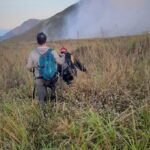THE 12 GUIDELINES: ENSURING AN ENJOYABLE WILDERNESS JOURNEY
Before you embark on an adventure, make sure you follow these 12 outdoor habits. However, you can also modify, improve or personalize any part of this to cope with the changing environment.
1. Pack Nothing That Becomes Trash
Avoid bringing any items that will become or generate trash during your trip. Not only does this help preserve outdoor areas, but it also promotes good habits that can be applied to daily life.
Learn How To Avoid Or Minimize Generating Trash
2. Avoid Unnecessary Purchase
This a pivotal concept in the context of minimizing our environmental footprint. It calls for thoughtful consideration before acquiring items we already possess or those with limited use, thus curbing excess consumption and reducing waste. By developing this habit, we help mitigate the environmental consequences of manufacturing, transportation, and disposal, contributing to a greener future.

By not buying things that you don't need or things that you already have, you are fostering a culture of responsible consumption that benefits both people and the planet.
Know the 10 Things You Really Need
3. Bring Your Trash Back Home
If generating trash becomes unavoidable, always pack it out and carry it back home. Never leave trash in the wilderness, rivers, beaches, or anywhere along the route from your home to your destination. Even the smallest trash such as candy wrappers and food scraps must be brought back home.

While it may seem like merely relocating trash, bringing it back home serves an important purpose: it allows us to experience firsthand the impact of waste accumulation in our own surroundings.
4. Keep The Noise Level Down
While it's okay to talk and socialize, loud noise can disrupt the peace and tranquility of the environment. Avoid shouting, playing loud music, or making excessive noise. Also, be mindful of noise pollution when camping or staying overnight in the wilderness, riverbanks or at the beach.
5. Stick To Established Roads, Trails, Campsites and Swimming Areas
Follow the paths and places that are already made for vehicles, hiking, camping and swimming. Do not go to new or unmarked areas. Stepping off the path can damage vegetation, wildlife habitats, and cause soil erosion. In some cases, hiking, camping or swimming on unmarked places can also be dangerous due to hidden hazards.
6. Respect The Locals
Take the time to research and understand the local customs and traditions of local communities or indigenous peoples that may reside in the area. This can include information on sacred sites, traditional practices, and cultural sensitivities. Consider the following guidelines for your visit to their community:
- Avoid wearing clothing that may be considered inappropriate or disrespectful to the local culture. This includes clothing that is revealing or has offensive language or images.
- Ask for permission before taking photos or videos of them or their homes. Do not take inappropriate photos or videos just to become viral as this can be disrespectful to the local culture.
- Refrain from assuming that indigenous individuals you encounter are in need of monetary assistance or food. Offering them money or food can be perceived as disrespectful and may undermine the self-sufficiency and resilience of indigenous communities.
- Avoid promoting the use of modern recreational equipment among indigenous communities, as doing so could potentially disrupt their cultural practices and traditions.
- Refrain from imposing foreign outdoor ethics onto indigenous communities. They have longstanding ties to the land and their own unique set of ethical principles that should be respected and upheld.

Be a culturally sensitive person. For centuries, indigenous communities have inhabited and cared for these lands, developing sustainable practices that prioritize harmony with nature.
7. Respect the Laws and Regulations
Follow the laws and any posted local regulations or signs. Different areas may have different regulations, depending on the local agency that manages them and the specific conditions and issues of each area. Make sure you know these regulations before you go.
8. Respect Other Visitors
Treat other visitors with courtesy and respect. Don’t do or say anything that might make them feel uneasy. If you travel in group, stay in a single line to let others pass, and leash your pets. Don’t block the trail or stop where you might get in the way of other visitors.

Alcohol and illegal drugs can affect your behavior in ways that can make other visitors and locals uncomfortable or unsafe.
9. Practice Fire Safety
If you're using a campfire, be sure to follow proper fire safety protocols. Use designated fire pits or stoves, keep the fire contained, and never leave it unattended. Also, check for any fire restrictions or bans in the area you're in.
Fires should be used with extreme caution. Unattended fire, no matter how small, may lead to forest fire!

10. Dispose Of Human Waste Properly
In forest locations, burying human feces may be the correct manner to dispose of your human waste. Choose a spot far away from trails, campsites and water sources. Instead of toilet paper, use: leaves, smooth rocks, water, or a small portable bidet for wiping and washing. One way to avoid this inconvenience is to go to the bathroom before you head out.
11. Leave Wildlife Alone
Let wildlife thrive undisturbed, respect their habitats and do not disrupt their natural behaviors for a healthy ecosystem.

Wild animals will do their best to avoid humans. If you see one, admire them from a safe distance and never chase or disturb them.
12. Leave Natural or Man-Made Objects Alone
Natural objects such as rocks, sand, plants, and fossils may be interesting to look at, but they should be left undisturbed. Moving them can disrupt the ecosystem and disturb wildlife. Man-made objects such as old artifacts, trail markers and signs should not be removed or disturbed.
When you develop these 12 Habits, you improve your own skills, knowledge, and performance. You also benefit from the positive outcomes and feedback that you receive. However, when you share these habits, you multiply the benefits for yourself and others. You help others learn from your experience and apply them to their own situations. You also create a culture of collaboration, innovation, and excellence. Sharing these habits is not only a way of giving back, but also a way of growing forward.








